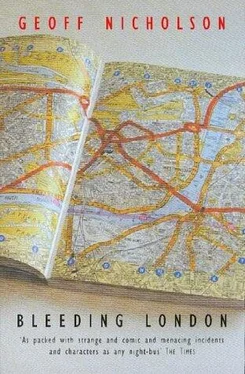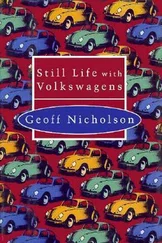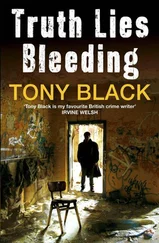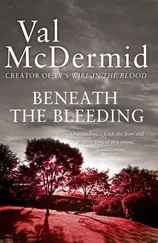The six men, as though obeying a strict, well-rehearsed choreography, flattened themselves on the floor. The shots had drilled harmless holes in the carriage’s walls and ceiling and upholstery. But when there are eight people in a severely confined space, a woman who doesn’t know how to use a gun, who doesn’t even look where she’s shooting, is every bit as dangerous and terrifying as a fully trained marksman.
“Untie him,” she said, her voice loud but trembling, and Sands got up, cautiously, with infinite care and began untying Mick.
Carr said, “She’s had six shots. I think the gun’s empty.”
“It’s an automatic, you twat,” said Mick, but it didn’t really matter. He knew there wasn’t going to be any fighting, any wrestling for the gun.
“We wouldn’t have killed you,” Sands said. “You realize that, I hope.”
Mick considered the statement but didn’t reply. He suspected it was probably true. Once untied, he took the gun from Judy’s shaking hand. He fired one last shot into the floor of the carriage. It lodged in the boards just a yard from Sands’ foot, a yard from Masterson’s head, and a yard from Carr’s hands.
“Stay where you are,” he said. “Don’t even think about moving till we’ve been gone at least half an hour.”
He knew they’d get their nerve back much sooner than that, so he shot holes in two of the Mercedes’ tyres. It was a shame. He’d have loved to steal the car, but Judy’s Datsun made a much less conspicuous getaway car.
“I saw it all,” Judy gushed as she drove. “I was coming to see you, to have breakfast with you maybe. I was driving around looking for somewhere to park when I saw you come out of your front door. Then I saw the six of them arrive and attack you and put you in the boot of the car. But what was I supposed to do? Call the police? So I followed them instead. They had no idea I was tailing them but they drove for miles and miles to this workshop place. I’m not very sure where we are, but I saw where they took you and I guessed what they must be doing to you. So I drove back to the Dickens, got the gun from your room, returned to the workshop, and you know the rest.”
“How did you know the gun was in the hotel room?”
“If you’d had it with you, you’d have used it when you were attacked, wouldn’t you?”
“Yeah, I suppose I would. Thank you,” he said. “I owe you a favour.”
“Only one?”
“How many do you want?”
“One will do if it’s the right one,” she said. “His name’s still Stuart London.”
Mick laughed in disbelief.
“I can’t do that,” he said weakly. “I’m sorry, but I don’t think I’m ever going to be able to do that stuff again.”
He was ready for all sorts of reactions from her. The one he’d have liked best involved her saying that she completely understood his distaste for, his satiation with, violence and revenge. He was not surprised when it didn’t come. Instead she simply stopped the car, slapped his face as hard as she possibly could and said, “Get out. Get out of my car. Now.”
He surveyed the empty, anonymous streets around them. He hadn’t the slightest idea where he was, but he wasn’t going to argue. He left the car as requested and stood motionless, watching as she drove away. He looked down at his suit and T — shirt, imagined the state of his face, and suddenly couldn’t help finding it all very funny. He sniggered to himself and then he started walking again, tarnished and afraid, and with absolutely no idea where he was going.
He looks bad, as though he has been in the wars, in a serious fight that he did not win. His face is roughed up, the integrity of the skin broken through, made ragged and livid; a cut lip, an eye bruised black, raw grazes on all the face’s hard, sharp, vulnerable edges. He’s wearing a petrol-blue suit that once must have looked immaculately sharp. Now it’s flayed out of shape, torn at the knees, streaked and clotted with ominous, sick substances. And under the suit there’s a white T — shirt, stained with dark islands and archipelagos of what can only be blood.
Then he sees the muggers and the man in the cashmere overcoat. He watches. He approaches. There’s some discussion, he finds the gun in his hand, the muggers are running, except for the one he’s managed to catch, and then the victim is telling him to stop, and he’s stopped, and there’s a map in his hand, an A — Z with all the streets obliterated and he’s saying, “You’re going to tell me there’s a really simple explanation for this, aren’t you?”
Stuart could, of course, explain everything and he was eager to do so. Mick was the perfect person to tell. The perfect witness, the perfect stranger. But this didn’t seem like the place to do any storytelling. He feared the muggers might be back and that they might have friends who were a lot rougher and more dangerous than they were.
“My car’s round the corner,” he said. “I could give you a lift somewhere.”
“That would be good,” Mick agreed.
They headed for the car and on the way there Mick did his best to describe where he wanted to go. The Dickens seemed to be his only option but, in the absence of a usable map, he didn’t know how to get there.
“Well, I can get you to Hackney,” Stuart said. “Once we’re there, maybe you’ll see something you recognize.”
Mick thought that was very unlikely but it was as good a plan as any.
“So what happened to you?” Stuart asked.
“I was in a fight.”
“Did you win?”
Mick looked down at himself again, at the mess and blood that was on his clothes.
“Yeah,” he said. “I suppose I did.”
They got into the car and Stuart started to drive faster than was either necessary or wise. He kept looking in his rearview mirror to see if they were being followed but Mick thought they were in more danger of being stopped by the police for reckless driving.
“I don’t know how to thank you,” Stuart said as he accelerated through a red light. “I don’t know what might have happened to me if you hadn’t appeared.”
“You’d have had your wallet taken,” Mick said curtly.
“Or worse.”
“I doubt it. They weren’t going to kill you, were they?”
“No, I suppose not.”
“Don’t sound so disappointed.”
Stuart’s face tightened with an assortment of unmatching emotions. There was trepidation, elation, relief, a hint of hysteria.
“Are you drunk?” Mick asked.
Stuart had to consider this before acknowledging that he had indeed been drinking. “Just a little,” he said. “I’ve been celebrating.”
“Yeah? What have you got to celebrate?”
Stuart tapped the blacked-out A — Z which he had placed carefully on the tray between the driver and passenger seat.
“I’ve done it,” he said. “I’ve covered London. I’ve walked down every single street in London.”
Mick took the A — Z and turned the pages, looking again at the firm, broad, black lines that had obliterated every street.
“And you crossed ‘em out as you went?”
“That’s it.”
Stuart was clearly expecting Mick to be impressed.
“Yeah, well I suppose it’s good to have a hobby,” Mick said mordantly.
“It was rather more than that,” Stuart snapped.
Mick thumbed through more of the obsessively marked pages and it appeared to be true. This did not look like the record of some easygoing pastime or distraction.
“So why’d you do it?” he asked.
“Because I was looking for something, or rather someone.”
Читать дальше












